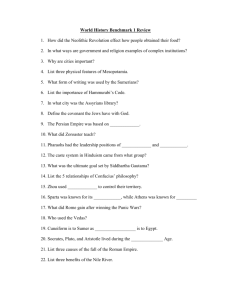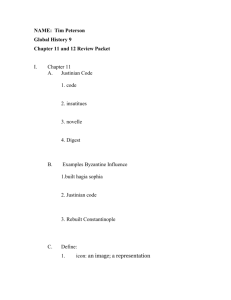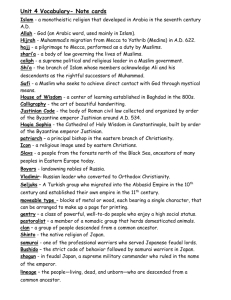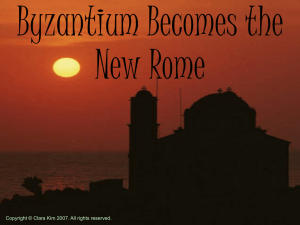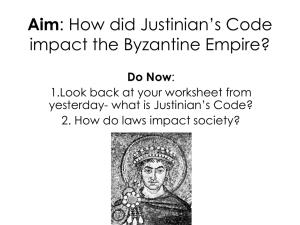Justinian I
advertisement
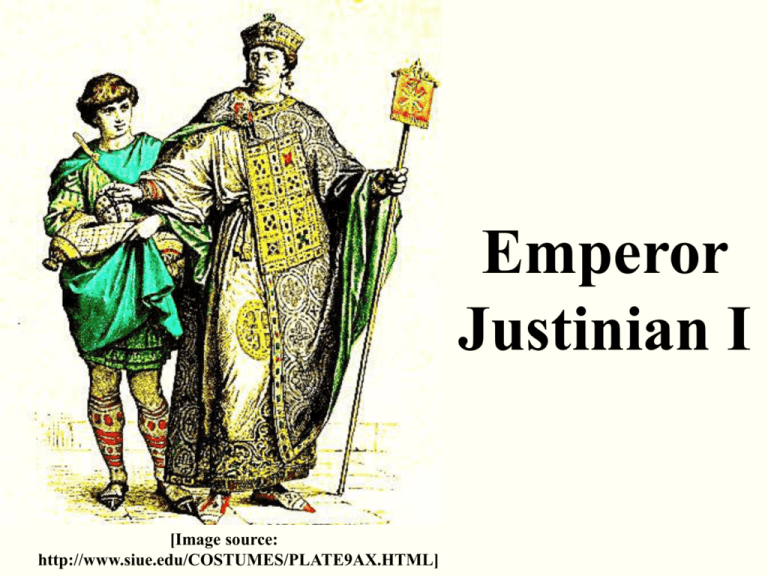
Emperor Justinian I [Image source: http://www.siue.edu/COSTUMES/PLATE9AX.HTML] At its height, the Byzantine Empire was ruled by Justinian I (r. 527-565). [Image source: http://www.bartleby.com/67/images/byzant01.gif] Justinian was the son of prosperous peasants from Macedonia. [Image source: http://www.mezzo-mondo.com/arts/mm/bruegel/BRP010_L.jpg] As a young man in the court of his uncle, Emperor Justin I, Justinian was a very conscientious student. [Image source: http://www.hyperbooks.com/images/scribe.jpg] Justinian’s enthusiasm for knowledge and hard work continued throughout his entire life. [Image source: http://www.softassteel.com/eileenwilks/images/scribe.jpg] Justinian was 44 years-old when he was crowned emperor of the Byzantine Empire in A.D. 527. [Image source: http://www.bethlehemcity.org/images/city/history/justinian.jpg] [Image source: http://courses.washington.edu/drama416/images/byzantine/byzantine2.jpg] Over the objections of his court, Justinian married an ambitious circus prostitute by the name of Theodora. [Image source: http://www.callisto.si.usherb.ca/~croisade/IM AGES/Theodora.jpg] [Image source: http://xenohistorian.faithweb.com/europe/Theodora.jpg] Theodora proved to be a capable empress, actively assisting Justinian in running the government. Concerned with improving the social standing of women, Theodora persuaded her husband to issue a decree giving a wife the right to own land equal in value to the wealth she brought to the [Image source: marriage. http://www.siue.edu/COSTUMES/images/PLATE9BX.JPG] Empress Theodora also managed to promote other social changes: • women gained the right to sue for divorce • prohibition against forced prostitution • death penalty in cases of rape Theodora’s determination inspired Justinian to be a more resolute ruler. [Image source: http://courses.washington.edu/drama416/images/byzantine/byzantine1.jpg] Political factions derived their names from the colours worn by charioteers. The Greens represented Monophysitism and the lower class. [Image source: http://www.siue.edu/COSTUMES/PLATE8AX.HTML] Monophysitism is the belief that Jesus Christ was divine. [Image source: http://www.lapraik.com/cordeaux/images/icon.Jesus.excellent.jpg] The Blues represented orthodoxy and the upper class. [Image source: http://www.siue.edu/COSTUMES/PLATE10AX.HTML] In A.D. 532 a revolt erupted among the spectators at a chariot race. [Image source: http://www.info-antike.de/unterhaltung/Circus_Maximus/Circus-1.jpg] [Image source: http://www.ulpiacoins.com/others/medieval_small.jpg] The Nika Revolt resulted from anger over excessive taxation. [Image source: http://www.siue.edu/COSTUMES/PLATE10CX.HTM When Empress Theodora refused to evacuate the capital, Emperor Justinian I decided to remain and fight the rebels. The Byzantine generals Narses and Belisarius ultimately led the Imperial Guard in fighting the rebels. [Image source: http://www.siue.edu/COSTUMES/PLATE9CX.HTML] Eventually 30,000 subjects would perish during the suppression of the rebellion. The Sassanian Empire of Persia threatened to conquer the eastern provinces of the Byzantine Empire . Although the Byzantines managed to rally their forces and repel the invaders, Justinian had to agree to pay tribute in exchange for peace. [Image source: http://mexplaza.udg.mx/wm/paint/auth/piero/san-francesco/battle.jpg] With his eastern flank temporarily secure, Justinian turned his attention to restoring the Roman empire. [Image source: http://fstav.freeservers.com/byzant867.j [Image source: http://www.siue.edu/COSTUMES/images/PLATE11AX.JPG] Under the leadership of the General Belisarius, the Byzantine armies were strengthened and reorganized. Belisarius then sailed to North Africa with a fleet of 500 ships. Feigning an attack near Egypt, he sailed on to land farther west along the coast. Between A.D. 533 and A.D. 555, the Byzantines fought a series of wars against the Vandals of North Africa, the Ostrogoths in Italy, and Visigoths in southern Spain. [Image source: http://www.teachinghearts.org/dr0imaprome10.gif] A Visigoth Christ [Image source: http://www.passionist.org/prc/gallery/wing-A/gallery3/g-10.htm] The Byzantines succeeded in conquering these Germanic groups and extended their rule in the west. [Image source: http://www.bartleby.com/67/images/byzant01.gif] The wars of re-conquest exhausted Byzantium’s resources, leaving it vulnerable to attacks in the East by an expanding Persian Empire. [Image source: http://www.anastos.nd.edu/images/byz9a.jpg] The success of the Roman campaign allowed Justinian to send Belisarius to the East in order to suppress several eastern barbarian uprisings. Remember: loot, pillage, THEN burn! Within a generation of Justinian’s death, the empire lost many of its outlying territories. [Image source: http://xenohistorian.faithweb.com/worldhis/map17.gif] Emperor Justinian I appointed a commission of ten scholars to codify the empire’s Roman laws. [Image source: http://www.siue.edu/COSTUMES/PLATE9AX.HTML] Under the distinguished jurist Tribonian, the commission took six years to collect and organize the Byzantine legal code. [Image source: http://www.aoc.gov/cc/art/lawgivers/images/tribonian.jpg] Justinian’s legal reforms • reduced the bulky old codes into one easy to read codex • created a book of legal precedents • standardized legal training in the empire [Image source: http://qsilver.queensu.ca/law/legalaid/tscales.gif] This work preserved Rome’s legal heritage and became the basis for most European legal systems. [Image source: http://www.victorianweb.org/victorian/books/mcdonnell/images/barrister.jpg] Justinian was very aggressive in the construction of roads, . . . [Image source: http://www.hdg.de/eurovisionen/images/technik/ostia.jpg] fortresses, . . . [Image source: http://www.louvre.fr/img/photos/audito/constant.jpg] aqueducts, . . . [Image source: http://www.users.globalnet.co.uk/~grayb/aqueduct.jpg] . . . and monasteries. [Image source: http://www.diavlos.gr/samos/samonastiri1.jpg] Justinian’s most famous project was the church of Hagia Sophia in Constantiople. [Image source: http://wiem.onet.pl/wiem/006e2f.html] Hagia Sophia means “Holy Wisdom”. [Image source: http://www.byzantina.com/images/6_4d_hagia_sophia.jpg]



